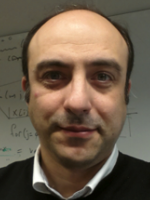Go to
Costas Bekas
Cognitive Technologies for R&D - The Next Horizon
Monday, 10 October 2016 at 14:00
Please contact me if you would like more details about the presentation.
Abstract:
Cognitive Computing is the new frontier of the information age. Computers have evolved into indispensable tools of our modern societies, having modernized numerous aspects of our everyday lives. Computers have facilitated the acquisition, storage and access of huge amounts of data since the very first electronic general purpose machines of the 1940s. Since then, we learned how to program computers in order to allow uses that even the wildest imagination of computer pioneers of the 50s and 60s did not capture, such as the internet, social networks and simulations of nature of incredible fidelity. Cognitive computing turns our trusted programmable machines, into cognitive companions. The systems are not programmed to simply achieve a task, but rather they are developed to reason with us in ways that are natural for us. They can debate with us, test our ideas, as these are expressed in natural language, against incredible volumes of data and give us insights that ultimately free us and let us focus on and use our deepest of human capabilities: intuition and intelligence. Cognitive systems mimic the way we humans reason, allowing us to express in unstructured ways, such as speech and vision in order to achieve in a small fraction of the previously required time feats such as pharmaceuticals and materials discovery, attacking cancer, understand complex natural ecosystems as well as man-made ecosystems such as the economy and technology. We will discuss the remarkable progress of cognitive computing and give a glimpse of what the future may look like.
About the speaker:
Costas Bekas is managing the Foundations of Cognitive Computing group at IBM Research-Zurich. He received B. Eng., Msc and PhD diplomas, all from the Computer Engineering & Informatics Department, University of Patras, Greece, in 1998, 2001 and 2003 respectively. Between 2003-2005, he worked as a postdoctoral associate with prof. Yousef Saad at the Computer Science & Engineering Department, University of Minnesota, USA. He has been with IBM since September 2005. Dr. Bekas' main research interests span cognitive computing, massive scale analytics and energy aware algorithms and architectures. Dr. Bekas is a recipient of the PRACE 2012 award and the ACM Gordon Bell 2013 and 2015 prizes.
Secondary navigation
- EPFL Workshop on Logic Synthesis and Emerging Technologies
- Luca Amaru
- Luca Benini
- Giovanni De Micheli
- Srini Devadas
- Antun Domic
- Rolf Drechsler
- Pierre-Emmanuel Gaillardon
- Jie-Hong Roland Jiang
- Akash Kumar
- Shahar Kvatinsky
- Yusuf Leblebici
- Shin-ichi Minato
- Alan Mishchenko
- Vijaykrishnan Narayanan
- Ian O'Connor
- Andre Inacio Reis
- Martin Roetteler
- Julien Ryckaert
- Mathias Soeken
- Christof Teuscher
- Zhiru Zhang
- Symposium on Emerging Trends in Computing
- Layout synthesis: A golden DA topic
- EPFL Workshop on Logic Synthesis & Verification
- Luca Amaru
- Luca Benini
- Robert Brayton
- Maciej Ciesielski
- Valentina Ciriani
- Jovanka Ciric-Vujkovic
- Jason Cong
- Jordi Cortadella
- Giovanni De Micheli
- Antun Domic
- Rolf Drechsler
- Henri Fraisse
- Paolo Ienne
- Viktor Kuncak
- Enrico Macii
- Igor Markov
- Steven M. Nowick
- Tsutomu Sasao
- Alena Simalatsar
- Leon Stok
- Dirk Stroobandt
- Tiziano Villa
- Symposium on Emerging Trends in Electronics
- Raul Camposano
- Anantha Chandrakasan
- Jo De Boeck
- Gerhard Fettweis
- Steve Furber
- Philippe Magarshack
- Takayasu Sakurai
- Alberto Sangiovanni-Vincentelli
- Ken Shepard
- VENUE
- Panel on Circuits in Emerging Nanotechnologies
- Panel on Emerging Methods of Computing
- Panel on The Role of Universities in the Emerging ICT World
- Panel on Design Challenges Ahead
- Panel on Alternative Use of Silicon
- Nano-Bio Technologies for Lab-on-Chip
- Functionality-Enhanced Devices Workshop
- More Moore: Designing Ultra-Complex System-on-Chips
- Design Technologies for a New Era
- Nanotechnology for Health
- Secure Systems Design
- Surface Treatments and Biochip Sensors
- Security/Privacy of IMDs
- Nanosystem Design and Variability
- Past Events Archive

 PhD, Manager
PhD, Manager